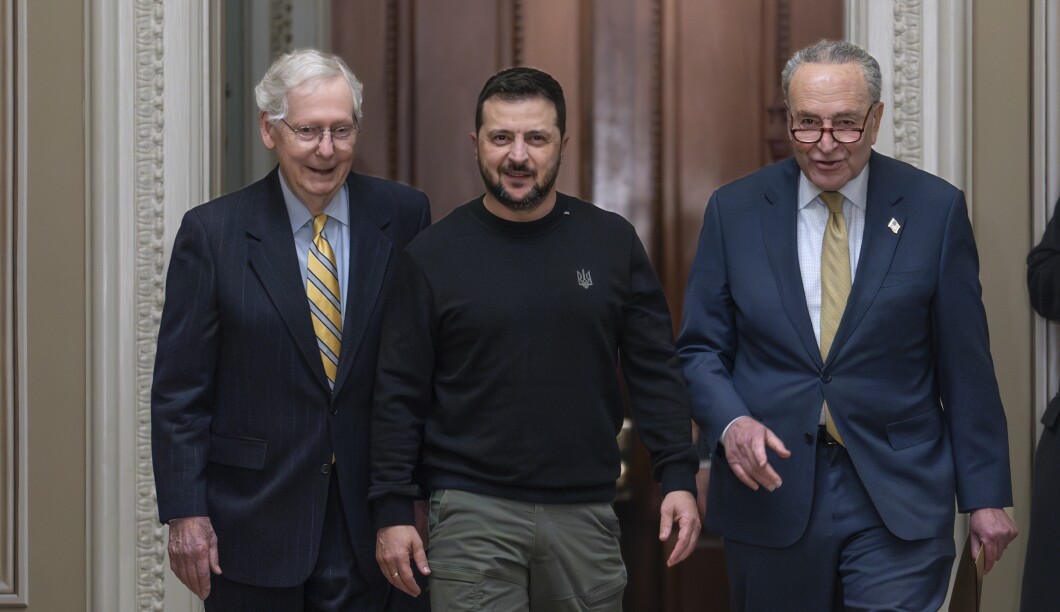
The senators negotiating over border security are more optimistic than ever they can reach a deal that unlocks billions in aid for Ukraine.
But the plodding pace to get there means lawmakers will return from their Christmas recess with a headache of titanic proportions.
NIKKI HALEY’S 2024 CAMPAIGN MOMENTUM UNDER NEW SPOTLIGHT IN IOWA CAUCUSES
Passing the bill was already going to be tough as conservatives skeptical of further Ukraine aid attempt to tank the legislation.
But the pressure cooker of government funding deadlines when they come back, plus the start of the presidential primary season, makes the legislation’s path through Congress even more perilous.
Senate leadership acknowledged on Tuesday what had been apparent for days on Capitol Hill — that a vote on aid for Ukraine would come no sooner than early January.
The delay did not come without consternation. Sen. Michael Bennet (D-CO) forced the Senate to stay in Washington for another week in the hope it would hasten a compromise on border security, the key to winning Republican support for a broader defense supplemental.
But the decision to break for recess without a deal in hand, announced by Senate Majority Leader Chuck Schumer (D-NY), reflected the political reality of negotiating on one of the thorniest issues to face lawmakers. Congress has not passed major legislation on immigration in 30 years.
Schumer released a joint statement with Minority Leader Mitch McConnell (R-KY) pledging “swift action” on the legislation in January, prompting Bennet to drop his objection to unrelated legislation keeping the Senate in session.
But the bill’s fate will depend on far more than the will of Senate leadership, which already favors Ukraine aid.
It’s looking increasingly likely the Senate will strike a deal on border security as immigrant crossings break daily records, with talks continuing Wednesday even after most senators departed for the Christmas recess. “Progress” has become the buzzword as tight-lipped negotiators brief reporters each day.
Those in-person meetings will become Zoom calls over the break, according to negotiators, but the intention is to keep working until a framework is reached.
“We’re all committed to doing it. And that’s the key thing, is everybody’s looking at each other going, ‘OK, this part’s hard, but we’re all here at the table,'” said Sen. James Lankford (R-OK), the lead Republican negotiator, on Tuesday afternoon. “We’re all working hard.”
Even if senators can reach a deal in principle, translating that compromise into legislative text will be thorny and time-consuming. Then comes the task of selling the agreement to colleagues.
The stakes of securing a deal — the White House says its Ukraine funding has dried up — mean the Senate has every incentive to broker a compromise, and fast. But the challenge becomes far more complicated in January.

Congress does not return until Jan. 8, giving lawmakers less than two weeks before a Jan. 19 deadline to fund the government. That date only applies to four funding bills, as the remaining eight expire on Feb. 3. But the prospect of passing Ukraine aid in the midst of what could be a shutdown fight presents a legislative headache for appropriators.
House conservatives, who hold outsize influence due to Speaker Mike Johnson’s (R-LA) razor-thin majority, want deep cuts to federal spending, while the Senate, led by Democrats, insists on levels set in the debt ceiling agreement passed in the spring.
Those levels represent marginal cuts when adjusted for inflation, but the Freedom Caucus has pushed Johnson, and Kevin McCarthy (R-CA) before him, for more, setting the two chambers on a collision course.
Leadership has yet to agree on top-line spending numbers.
Making matters worse, many of those same conservatives oppose further aid to Ukraine as its war with Russia approaches the two-year mark. The conflict has settled into a stalemate despite Ukraine’s long-anticipated counteroffensive.
Defense hawks have previously tried to attach the supplemental, which would provide assistance to Ukraine but also Israel and Taiwan, to short-term funding extensions, but appropriators now seem to prefer keeping the votes separate so the defense legislation does not get tossed aside once again.
“I think combining the appropriations bills with the supplemental would increase the complexity of trying to get each through,” said Sen. Susan Collins (R-ME), the top Republican on the Appropriations Committee.
If the border working group can reach a deal by the time Congress returns, including the nitty-gritty details on changes to asylum law and possibly parole, an early January vote is possible.
“My hope would be that we come back on the 8th and it’s ready to go; we vote it out at that point,” said Sen. Chris Coons (D-DE), a Democratic appropriator.
But the bill could nonetheless become tangled up in government funding as the House decides whether to take up the legislation.
Johnson, a Ukraine skeptic himself, is willing to bring up the supplemental if paired with “transformative” border reforms. But the support an eventual compromise can muster in the House could very well determine its fate. Opposition from progressives is anticipated regardless, but especially so if the deal struck has teeth.
Instrumental to GOP resistance will be former President Donald Trump, who opposes U.S. involvement in Ukraine and is likely to dismiss a border compromise as insufficiently conservative.
The former president, running for a second term in the White House, holds enormous sway over the Republican Party, and Democrats readily acknowledge he is a “wild card” in the talks.
The fact that Iowa will hold its caucuses, the first in the presidential election season, on Jan. 15 only makes the politics of the legislation more charged.
House politics aren’t the only considerations. Senate leadership will also have to navigate opposition from Republicans within their chamber.
CLICK HERE TO READ MORE FROM THE WASHINGTON EXAMINER
Over the weekend, Senate conservatives requested a briefing on the supplemental after Congress returns, a bid to stall anything from passing this year. They pressed for further delays on Wednesday in a letter demanding regular order, including committee hearings and an open amendment process.
“It is only with this commitment to a robust process can we even hope to secure the American public’s confidence in our actions,” reads the letter, led by Sen. Eric Schmitt (R-MO).





